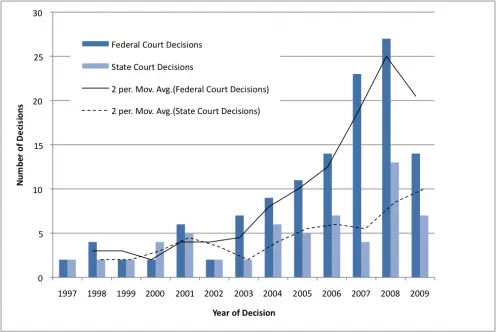
Getting empirical with Section 230 case law
Citizen Media Law Project director David Ardia's study of all CDA section 230 cases to date is now available in the Loyola of Los Angeles Law Review.
From the Citizen Media Law Project blog:
As many of you who read this blog know, we spend a lot of time thinking about -- and sometimes debating -- section 230 of the Communications Decency Act. We've often lamented, however, that there isn't a good compilation of all of the 230 cases (Eric Goldman, the dean of the 230 bar, has covered most, if not all, of the cases, but you have to sift through his excellent blog to find them [Eric Goldman's critique of the study]). Well, back in 2008, I set out to create just such a compilation and after months of wrangling with my editors, the empirical study that research spawned is finally out in the current edition of the Loyola of Los Angeles Law Review.
I won't recount the entire article in this post..., but I will highlight a few of the more interesting findings. First, here is the abstract:
In the thirteen years since its enactment, section 230 of the Communications Decency Act has become one of the most important statutes impacting online speech, as well as one of the most intensely criticized. In deceptively simple language, its provisions sweep away the common law's distinction between publisher and distributor liability, granting operators of Web sites and other interactive computer services broad protection from claims based on the speech of third parties. Section 230 is of critical importance because virtually all speech that occurs on the Internet is facilitated by private intermediaries that have a fragile commitment to the speech they facilitate.
This Article presents the first empirical study of the section 230 case law. It begins by providing a doctrinal overview of common law liability for intermediaries, both online and offline, and describes how section 230 modifies these doctrinal approaches. It then systematically analyzes the 184 decisions courts have issued since the statute's enactment. The Article also examines how courts have applied section 230, finding that judges have been haphazard in their approach to its application.
The Article closes by discussing the study's findings and by offering some insights into how plaintiffs and defendants have fared under section 230. While section 230 has largely protected intermediaries from liability for third-party speech, it has not been the free pass many of its proponents claim and its critics lament. More than a third of the claims at issue in the cases survived a section 230 defense. Even in cases where the court dismissed the claims, intermediaries bore liability in the form of litigation costs, and it took courts, on average, nearly a year to issue decisions addressing an intermediary's defense under section 230.
MORE!
- John Palfrey and Adam Thierer's spring 2009 debate about section 230 in Ars Technica; and
- the Citizen Media Law Project's section 230 resource page.
